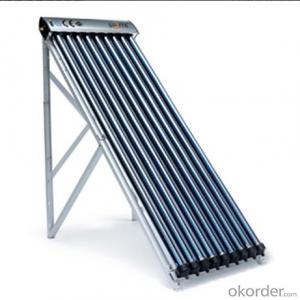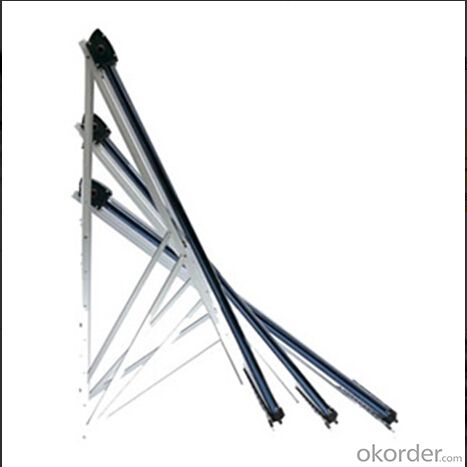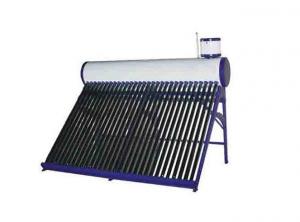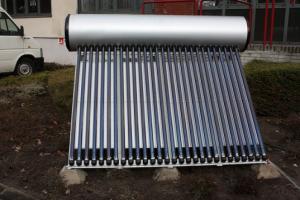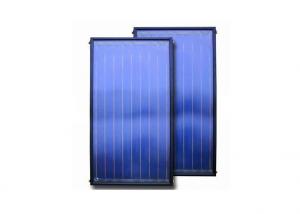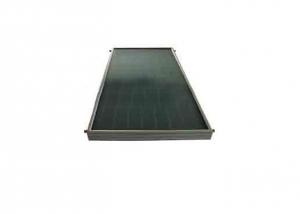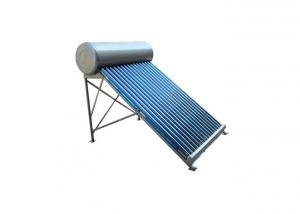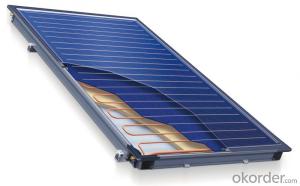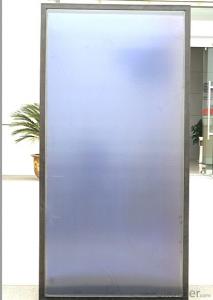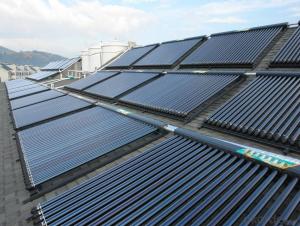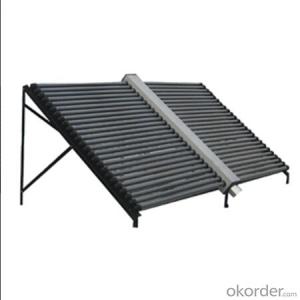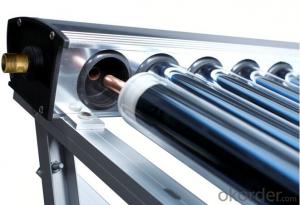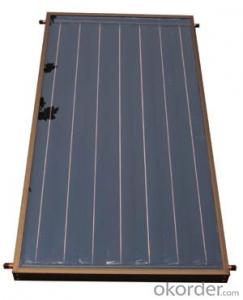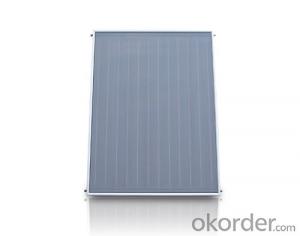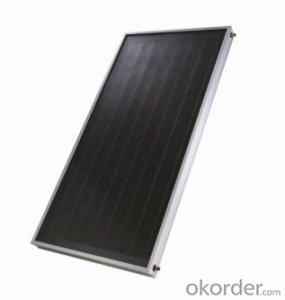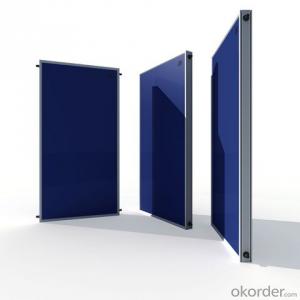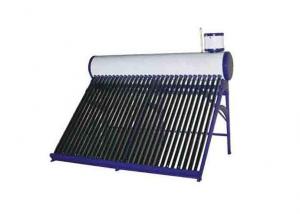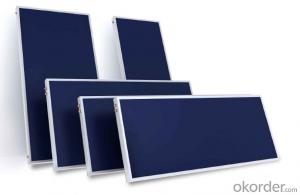Focus Type Solar Collector with Adjustable Frame Model SC-HAJ
- Loading Port:
- Shanghai
- Payment Terms:
- TT OR LC
- Min Order Qty:
- 1 set
- Supply Capability:
- 2500 set/month
OKorder Service Pledge
OKorder Financial Service
You Might Also Like
1. Structure of Solar Collecter with Adjustable Frame Model SC-HAJ
Solar collector of this series are made of aluminum alloy for frame, rock wool for the installation, tri-element vacuum glass tube and antifreeze heat pipe. It can work under the temperature -40℃-300℃. The components are following as shown with graphic:
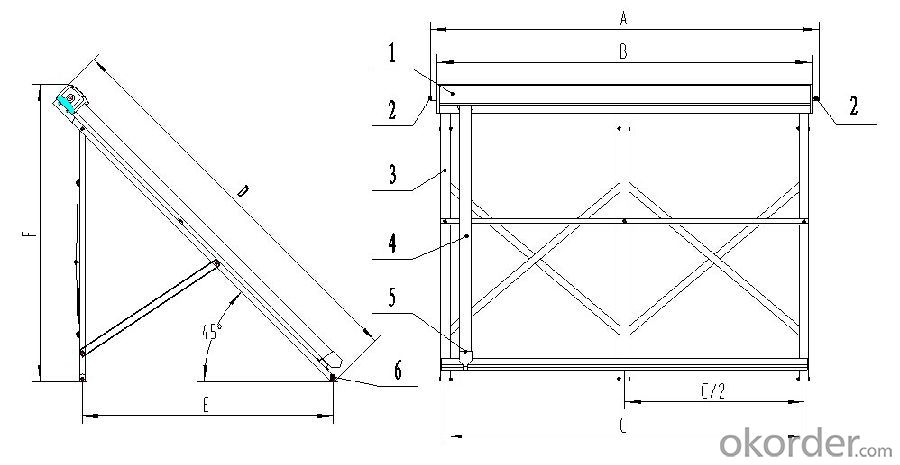
1.Solar collector manifold :1.1 Manifold shell; 1.2 Thermal insulation; 1.3 Inner tank;
2.Solar collector connector
3,Solar collector bracket
4.All glass vacuum tube: 4.1 Vacuum tube; 4.2 Aluminum fin; 4.3 Heat pipe
5.Tube holder
6.Wind fee
2. Main Features of Solar Collecter with Adjustable Frame Model SC-HAJ
. The Frame degrees can be adjusted to fit any latitude.
. The manifold can be moved to left or right side to fit the different kinds roof styles.
. The frame material can use the Aluminum alloy from 2.0-3.0mm.
3. Solar Collecter with Adjustable Frame Model SC-HAJ Images
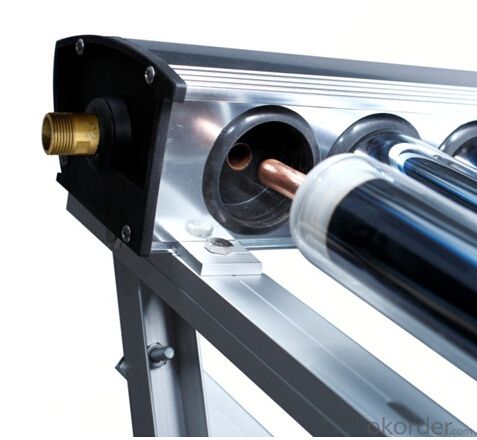
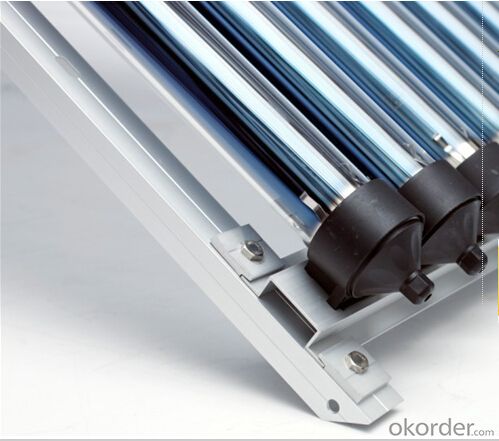
4. Solar Collecter with Adjustable Frame Model SC-HAJ Specifications
Model | SC-HAJ-10 | SC-HAJ-15 | SC-HAJ-18 | SC-HJA-20 | SC-HAJ-24 | SC-HA-25J | SC-HAJ-30 |
SC-H1-10 | SC-H1-15 | SC-H1-18 | SC-H1-20 | SC-H1-24 | SC-H1-25 | SC-H1-30 | |
Vacuum tube quantity(pcs) | 10 | 15 | 18 | 20 | 24 | 25 | 30 |
Tube spacing (㎜) | 75 | ||||||
Vacuum tube diameter/length (㎜) | φ58/1700 | ||||||
Vacuum tube material | high borosilicate glass 3.3 | ||||||
Vacuum tube inner/outer pipe wall thickness (㎜) | 1.6/1.8 | ||||||
Heat pipe condensing end diameter/length (㎜) | φ14/1750 | ||||||
heat pipe material/wall thickness (㎜) | Copper tp2/0.6 | ||||||
inner tank diameter/wall thickness (㎜) | φ35/1.0 | ||||||
connector size | φ22 or 3/4″ | ||||||
collector insulation material/thickness (㎜) | Rock wool/40 | ||||||
solar collector rated pressure (MPa) | 0.6 | ||||||
collector operating temperature ℃ | <100 | ||||||
collector volume (L) | 0.69 | 0.98 | 1.15 | 1.27 | 1.50 | 1.56 | 1.85 |
collector aperture area (㎡) | 1.0 | 1.5 | 1.8 | 2.0 | 2.4 | 2.5 | 3.0 |
collector total area (㎡) | 1.56 | 2.30 | 2.74 | 3.04 | 3.63 | 3.77 | 4.51 |
referral traffic (L/min) | 0.75 | 1.13 | 1.35 | 1.50 | 1.81 | 1.88 | 2.26 |
intensity pressure (Pa) | 23.2 | 59.2 | 90.6 | 116.7 | 181.7 | 200.2 | 314.0 |
intercept efficient η0 | 0.744 | 0.744 | 0.744 | 0.744 | 0.744 | 0.744 | 0.744 |
heat loss coefficient a | 2.09 | 2.09 | 2.09 | 2.09 | 2.09 | 2.09 | 2.09 |
collector power (W)1000W/㎡ irradiation | 620 | 870 | 1047 | 1165 | 1401 | 1457 | 1748 |
collector net weight (kg) | 38.25 | 50.75 | 59.75 | 64.75 | 79.00 | 83.35 | 98.70 |
a (㎜) | 895 | 1270 | 1495 | 1645 | 1945 | 2020 | 1395 |
b (㎜) | 800 | 1175 | 1400 | 1550 | 1850 | 1925 | 2300 |
c (㎜) | 725 | 1100 | 1325 | 1475 | 1775 | 1850 | 2225 |
c/2 (㎜) | —— | —— | —— | —— | 887.5 | 925 | 1112.5 |
d (㎜) | 1980 | 1980 | 1980 | 1980 | 1980 | 1980 | 1980 |
e (㎜) | 1240 | 1240 | 1240 | 1240 | 1240 | 1240 | 1240 |
f (㎜) | 1470 | 1470 | 1470 | 1470 | 1470 | 1470 | 1470 |
5. FAQ
1. What happens if one of the solar tubes is broken?
Firstly, tubes are very strong and not easily broken, but if the worst should happen, solar tubes can be replaced very easily. They are inexpensive and available. The solar collectors can operate with several broken tubes, but the efficiency will be reduced, so it is recommended that broken tubes be replaced immediately.
2. Can the solar collectors be mounted on a flat surface?
Yes they may be mounted on a flat roof or on the ground by using a stainless steel Flat Roof Frame. The collector should be installed at a minimum of 20o angle to ensure optimal operation of the heat pipe.
3. Will the solar collector be a fire hazard during hot, dry weather?
No. The solar collector's components are all high temperature rated and non-flammable, so even during strong sunlight with the circulation pump turned off (stagnation), the system will not catch alight or give off any sparks. The majority of the solar collector's components are stainless steel, aluminium, glass or glass wool. The manifold outlet should be fitted with a temperature relief valve, which will prevent the manifold temperature from exceeding 99oC / 212oF.
- Q: Can solar collectors be used for heating roadways?
- Yes, solar collectors can be used for heating roadways. Solar thermal technology, such as solar panels or pipes filled with a heat transfer fluid, can capture the sun's energy and transfer it to heat the roadway. This can help prevent ice formation, improve road conditions in cold climates, and reduce the need for traditional de-icing methods.
- Q: How do solar collectors affect noise pollution?
- Solar collectors do not add to noise pollution because they do not generate any sound when in operation. Unlike traditional energy sources like fossil fuel power plants or wind turbines, solar collectors do not need any moving parts to produce electricity. This implies that there are no mechanical elements, such as turbines or engines, that can cause noise. Consequently, solar collectors have no effect on noise pollution and are regarded as a quiet and environmentally-friendly energy solution.
- Q: Can solar collectors be used in all climates?
- Solar collectors can be used in all climates, although their effectiveness may vary depending on the amount of available sunlight. In regions with high levels of sunlight, such as deserts, solar collectors can be highly efficient. However, even in colder or cloudier climates, solar collectors can still generate some energy, albeit at a lower rate.
- Q: Can solar collectors be used for heating fire stations?
- Yes, solar collectors can be used for heating fire stations. Solar thermal systems can provide heat for water and space heating needs, reducing reliance on traditional heating systems and minimizing energy costs. However, the feasibility and effectiveness of using solar collectors will depend on factors such as the available roof space, local climate, and the heating demand of the fire station.
- Q: Can solar collectors be used to generate electricity for electric vehicle charging stations?
- Solar collectors, like PV panels, have the capability to generate electricity for charging stations dedicated to electric vehicles. These collectors are specifically designed to directly convert sunlight into usable electricity. The electricity produced can then be utilized to power the charging stations, providing a clean and renewable energy source for charging electric vehicles. By harnessing solar energy, these charging stations can decrease their reliance on traditional fossil fuels and contribute to a transportation system that is more sustainable and environmentally friendly. Moreover, solar energy can be stored in batteries or fed back into the grid, guaranteeing a consistent and dependable power supply for the charging stations, even during periods of limited sunlight. In summary, integrating solar collectors into the infrastructure of electric vehicle charging is a practical and effective method to encourage the adoption of electric vehicles and reduce carbon emissions.
- Q: Can solar collectors be used in disaster relief efforts?
- Yes, solar collectors can be used in disaster relief efforts. They provide a sustainable and reliable source of energy, enabling the operation of essential equipment, lighting, and communication devices in areas affected by disasters. Solar collectors also provide a clean and renewable energy solution, reducing the reliance on fossil fuels and minimizing environmental impact during relief operations.
- Q: Can solar collectors be used in wastewater treatment?
- Yes, solar collectors can be used in wastewater treatment. They can be utilized to provide heat for various processes such as sludge drying, evaporation, and disinfection, thereby reducing the energy consumption and costs associated with wastewater treatment. Additionally, solar energy can be harnessed to power pumps, aeration systems, and other equipment used in wastewater treatment plants, making the process more environmentally sustainable.
- Q: Can solar collectors be used for heating mosques?
- Yes, solar collectors can be used for heating mosques. Solar collectors, such as solar thermal systems or solar panels, can harness sunlight to produce heat and provide a renewable energy source for heating purposes. By installing solar collectors on the rooftops or nearby areas of mosques, the captured solar energy can be used to heat the building, reducing the reliance on traditional fossil fuel-based heating systems. This can contribute to the mosque's sustainability and environmentally-friendly practices while reducing energy costs.
- Q: Can solar collectors be used for generating electricity on bicycles?
- Solar collectors can indeed be used for generating electricity on bicycles. Solar panels can be mounted on the frame of the bicycle or integrated into accessories such as panniers or bike trailers. These solar panels convert sunlight into electricity, which can be used to power various devices and accessories on the bicycle. The electricity generated by the solar collectors can be stored in batteries or used directly to power lights, GPS devices, smartphones, or even electric motors in e-bikes. This can be particularly useful for long-distance cycling or bike touring, where access to electrical outlets may be limited. By harnessing solar energy, cyclists can reduce their reliance on traditional power sources and make their rides more sustainable. However, it's important to note that the amount of electricity generated by solar collectors on bicycles may not be sufficient to fully power the bicycle itself. The small size of the solar panels limits the amount of energy they can generate, especially considering the power requirements of electric motors. Therefore, solar collectors on bicycles are typically used to supplement the main power source, such as a battery pack, rather than replacing it entirely. In conclusion, solar collectors can be used effectively on bicycles to generate electricity for various accessories and devices, enhancing the sustainability and self-sufficiency of cyclists. While they may not be able to fully power the bicycle, they provide a valuable alternative energy source that can be utilized on the go.
- Q: Can solar collectors be used for heating resorts?
- Yes, solar collectors can be used for heating resorts. Solar thermal systems can efficiently capture sunlight and convert it into heat energy, which can be used for various purposes including heating water for pools, spa facilities, and even central heating systems in resorts. This renewable and sustainable solution can help reduce energy costs and carbon emissions in the hospitality industry while providing a comfortable and eco-friendly experience for resort guests.
Send your message to us
Focus Type Solar Collector with Adjustable Frame Model SC-HAJ
- Loading Port:
- Shanghai
- Payment Terms:
- TT OR LC
- Min Order Qty:
- 1 set
- Supply Capability:
- 2500 set/month
OKorder Service Pledge
OKorder Financial Service
Similar products
Hot products
Hot Searches
